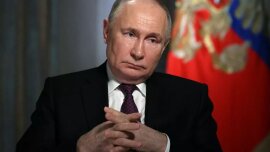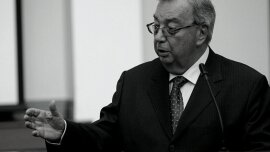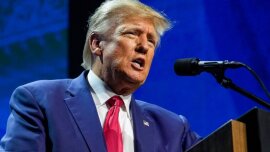by OLEH ROMANCHUK, PHD
The term "hutzpa" in modern Hebrew means "impudence"
Hutzpa is also defined as "a particularly cynical, vile, defiant lie," "the height of cynicism and insolence that paralyzes the opponent."
From Wikipedia, the free encyclopedia.
The historical emergence of power is based on the right of the people to self-defense, protection of the nation, the people from external danger. This, of course, is joined by protection from internal danger, from crime. Therefore, since its inception, the government has combined military and police functions. Everything else - secondary, ie what can be done in its pure form (without ornaments) - is the military and police protection of the population living in a particular area.
Such power is legitimate - with the consent of the people, it removes the form of organized violence against it. These two processes of power formation - protection from external violence and violence against one's own people - are historically and organically interconnected. Despotism and totalitarian regimes were born and strengthened primarily in countries that were constantly threatened by external aggression, and, conversely, where it weakened, democratic and liberal tendencies began to develop. The threat of external aggression contributes to the establishment of the absolutism of power or its strengthening, and when there is no such threat, the government imitates it.
The German General Staff was most interested in the anti-government uprising in the Russian Empire. However, they had no money, the money was in the state treasury. In Berlin. From where they were sent by the German Social Democrats, who sent it to the Bolsheviks through Switzerland to neutral Denmark, then to Stockholm, and from there to Petrograd to the Siberian Bank and legalized in the form of income through a pharmacological firm…
As an agent of the German General Staff (this thesis is not historically proven, this is the author's assumption - editor), the Bolshevik leader Ulyanov-Lenin with the help of billions of marks carried out a colossal sabotage: destroyed the Russian army, imposed a predatory Brest peace, threw the country into the chaos of civil war and red terror. In other words, Lenin and the party he led committed treason, which is punishable by the death sentence of the tribunal under the laws of war. And it was not without reason that the Bolshevik leader rehearsed so hysterically about the ultimate need for the conclusion of the Brest Peace, because he understood that if he had not fulfilled his obligations to the Germans, he would have been immediately exposed as a spy with all the consequences.
When Russian counterintelligence discovered Lenin's financial schemes, Stalin immediately hid him at Razliv lake. Further history is known. In fact, we all still pay for the billions Lenin received…
Of course, the given example of criminal activity of a political party against its people and state is unique, but at the same time it is characterized by the fact that a political party is able to go against the state, against the people, without stopping at any meanness.
When Montesquieu proclaimed the principle of separation of powers in the late eighteenth century, he did not actually make any discoveries. This principle has existed since time immemorial: in the origins of human self-organization in tribal and later state structures. Initially, the role of the legislature was played by the people's assembly. In ancient Rome there was a people's assembly, senate, consulate, tribune. Only the judiciary was vaguely defined. It belonged to the National Assembly, the Board of Priests, the tribunes, and specially elected judges. Throughout human history, the judiciary has been a bone of contention between the legislature and the executive. This is still observed today. In Ukraine in particular.
The strongest branch of government is, of course, the executive branch - the means of violence are concentrated in it, and it resorts to them without hesitation when the appropriate conditions arise. In the struggle against the legislature, the executive has always resorted to and resorted to centuries-old method - demagogically speaking allegedly from the standpoint of protecting the interests of the people from the ruling oligarchy.
Julius Caesar was able to destroy the republic and begin to transform it into an empire, leading the movement of Democrats and plebeians. Ivan IV, nicknamed the Terrible, in the fight against the nobility, which played the role of the legislature, relied on the lower classes. Louis XI in the struggle against the French feudal lords sought allies among the urban bourgeoisie ...
The historical experience of mankind shows that as soon as the executive branch rises to its representative power, it quickly removes its autocratic features and immediately forgets about its promises of progressive transformation, and all its concerns are aimed at strengthening autocracy. History knows no exceptions in this regard. The next step for the executive after the suppression of parliament is the introduction of strict censorship and complete subordination of the media. Elections and the so-called expression of the will of the people are imitated.
Here is how Lenin explained destroy democratic press and the introduction of one of the most brutal censorship in the XX century: " Freedom of the press in the RSFSR, surrounded by bourgeoise enemies from all over the world is the freedom of political organization of bourgeoisie and its prime servants, Mensheviks and Esers. The bourgeoisie (all over the world) is even stronger than us many times over. To give it another weapon, such as the freedom of political organization (= freedom of the press, because the press is the center and basis of political organization), means to make things easier for the enemy, to help the class enemy. We do not want to commit suicide and therefore we will not do it. "
Myroslava Barchuk, the host of the Countdown program of the Public Broadcasting, accused the representatives of the President's Office of putting pressure on the channel to invite on air deputies from the Servant of the People faction.
During Volodymyr Zelenskyy's stay in Cherkasy region, journalists had the opportunity to hear a rather contradictory comment from the President on Myroslava Barchuk's statement: “If she says that I told her something personally or it was the Head of the Office, because these are people dealing with communication issues in the Office who have influence. If the head of the Office, Andriy Yermak, has ever heard the name you said, then it's another matter - I will definitely take care of it. "
Strange rhetoric. Unfortunately, there is a danger of an attack on freedom of speech in Ukraine. Since 2019 in Ukraine there is a creeping Lukashenko-style of state institutions, usurpation of power. The paternalism and infantilism of many Ukrainians, their unpretentiousness to authorities, works for the "Servants of the people", especially those close to their leader.
Every state as a system, provided that its activities do not provoke active resistance from the people, seeks to become totalitarian, that is, to concentrate in itself the fullness of unlimited power. In such a state, everything that is beneficial to it is moral, and everything that is not beneficial is immoral. Therefore, devotion to the suzerain (king, dictator, ruling party and its leader, president) becomes the pinnacle of moral virtues, and between this devotion and patriotism is a sign of equality. The personal moral qualities of the leaders of a totalitarian state are absolutely useless. If, say, there was another leader instead of Stalin, such as Rykov or Bukharin, they would act in the same way as Joseph Vissarionovich, and if Trotsky were in his place, it would be many times worse. The personal qualities of Yagoda, Yezhov, and Beria played absolutely no role. The communist system could not have existed otherwise. State violence against a person has become a moral norm, power was worshiped…
It is very symptomatic that Oleksandr Kornienko, the leader of the Servant of the People party, called the President of Ukraine a "practical and spiritual leader " of the political force. The People's Deputy apparently did not hear Konstantin Yeliseyev, the former Deputy Minister of Foreign Affairs of Ukraine. Because, according to him, Western leaders have studied Zelenskyy's psychotype well and already know that the Ukrainian president does not accept any critical remarks, even if they are fair; this makes him aggressive, leads to the fact that there will be no dialogue.
And for some reason Kornienko did not notice that in the minds of Vladimir Zelenskyy there was a deep distortion in the understanding that the only source of power is the people.
Thus, in his speech at the VII Extraordinary Congress of the Servant of the People party, the Ukrainian president raised a very controversial issue of the referendum: “We promised democracy through a referendum. And this is another important point of the program that needs to be done… For the first time in the history of the country, your opinion will be asked not on Facebook, but on a national level. And it is you who will shape the agenda on key issues, decide what is good and what is bad, what the country needs and what it doesn’t. "
As Vladimir Lenin liked to repeat, "the idea that has taken hold of the masses is becoming a great force." If there are people in society who do not accept the Great Purpose, then the "great power" destroys them.
Such traits (which the Jews call "hutzpa", from Yiddish, goes back to Hebrew - hutspe - audacity or impudence as a property of character) – are the boundless thirst for money and power as a means of increasing their wealth, as well as lies and bravura and good gestures that carry a pronounced pathology, which is already visible to the naked eye. Psychologists and psychiatrists have long noticed psychopathic traits in people of this type. Their desire for power in politics and business at the same time is the dominant character traits of such people, it is their second "I", it is their "hutzpa". "Hutzpa" is also defined as "a particularly cynical, vile, defiant lie" or "the height of cynicism and insolence that paralyzes the opponent."
This excerpt from the article by Hryhoriy Omelchenko, the Hero of Ukraine, which was published in early 2018, involuntarily evokes certain associations after the publication of Pandora Papers and clarifies a lot.
On October 3, the premiere of the film "Investigation.info" based on Pandora Papers about the offshore business of Volodymyr Zelenskyy and his entourage took place. Just two weeks later, the Ukrainian president was able to comment on the results of an analysis of documents involving The International Consortium of Investigative Journalists. Zelenskyy admitted offshores, but denied money laundering. Like, "we were engaged exclusively in creativity." However, Zelenskyy did not explain why offshore firms are still not closed and whether he receives dividends from them. In an interview with ICTV, the President of Ukraine stated that Pandora Papers did not see "anything new" in the materials of the leak: " It's all an old story, I've heard it all, I've seen it all, all these details. I am glad that I did not see any new details. This means that since 2019, Comrade Petro has not found anything for me, as the President of Ukraine. " It is reminiscent of the classic "hutzpa". And really. Who is this kind of sarcastic "comrade Peter ", who since 2019 has not found anything on Vladimir Zelenskyy? We must think that we are talking about Petro Poroshenko. But why is the former president of Ukraine here? "More than 600 journalists from 117 countries examined 11.9 million confidential files during the year - this is the largest leak of confidential documents in history, " Slidstvo.Info writes.
Dmytro Razumkov's resignation as Speaker of the Verkhovna Rada proves that the President and his immediate entourage are not satisfied even with the scenery of parliamentarism that Razumkov somehow created.
Commenting on the accusations of the opposition in non-compliance of the Verkhovna Rada during the enactment of the oligarchs and the release of speaker Dmitry Razumkov a deputy of the "Servants of the People" and a member of the defense committee in parliament Irina Vereschuk said: "We have the opportunity not looking right and left, not looking for political expediency, to make decisions at the highest legislative level. In the executive branch. So? When the Cabinet of Ministers is formed by one political force. This is unprecedented. This is historical. We are obliged to fulfill what the Ukrainian people put us here for. And if we will be engaged in surnames there, you know, I want I don't want, I can't I can't, I won't be. It is enough to chew snot. It is enough to tell about regulations. Suffice it to say that we can't do something again . You know what something always bothers a bad dancer? Regulations? Let's change the rules. "
It seems that Mrs. Vereshchuk, who has already declared her readiness to become Minister of Defense (lieutenant with offshore at the head of the SBU is not enough for us?!), was not critically acquainted with the work of Lenin. This is what he commanded: "It is unwise to waste time on abstract reasoning when life requires practical solutions ." Or: "Less political chatter. Less intellectual reasoning. Closer to life.
That is, Iryna Vereshchuk is convinced that the Rules of Procedure can be ignored. According to the logic of the former mayor of Rava-Ruska, the People's Deputy from the "Servants of the People" can mutilate people by car and not be held accountable, the president does not need to comment on the Pandora Papers investigation (in Chile, for example, impeachment proceedings have already begun) that names Ukraine as the world leader in the number of politicians who use offshore schemes…
Danilo Hetmantsev, another MP from the Servant of the People political party, takes the same dubious position on the possibility of ignoring the Verkhovna Rada Rules of Procedure: “The Rules of Procedure do not mean that we must comply with every article of this law. <…> So, the rule for the Verkhovna Rada as such, as the highest legislative body of the state, is to deviate in one form or another from the unprincipled norms of the regulations. "
What kind of observance of the Law in Ukraine can we talk about if the parliamentary interim commission of inquiry deliberately slows down the investigation of the fact of possible treason in the Wagnergate case, which is not beneficial to the authorities? At the same time, the explanations of the head of the commission, deputy chairman of the Committee on National Security, Defense and Intelligence Mariana Bezugla, who has been in charge of the Ukrainian Security Service reform for the second year, are confusing. Some incomprehensible flow of consciousness: “In general, we will in general exactly join the presumed … state well… it is no longer a private history for sure. It was the Russian Federation and its special services. And also more than twenty of them took part in the conflict in general during events of the armed aggression of the Russian Federation in the East. <…> Let's still hold a briefing as part of the intellectual distribution. "
However, Marian Bezugla has previously demonstrated verbal illustrations confirming the reality of the Dunning-Kruger effect. In particular, at the All-Ukrainian Forum "Ukraine 30 payments": " And now we have what we have and must correct it… what… within our committee and… energy security, again, it was already said … about that… except… except… itself…. electricity and the question of how difficult it is to find a balance between imports and … prices for the population. Nevertheless, we must strive for our own capacities. This is a question of joining the European space again. The very goal is to supplement the logistics component and different categories within energy, ie energy issues, because from a national security point of view there are more general things that I can say… it is very important that we achieve it in the coming years and bring it to the political… and not only to the economic plane, but also to preserve that political narrative. Rather, the political range acceptable to the people "….
And this is the rhetoric of the Ukrainian president: "Thank you ... Ah ... Thank you. Then I wish everyone success. This is the most important thing. In my opinion. I'll keep it short. You know. I was today for the first time in my life. Here. In Zhytomyr Polytechnic. You know, wonderful. Great university that I saw. Saw. And so. We are used to it. We all studied at universities. First, I saw. A. State University. And when we see the phrase state university and come later. What do we see? We see. Today I saw. This feeling is modern, private. Something is not ours. And that's why I'm impressed. Just very satisfied. As a citizen of Ukraine, that there is such a university. But the most important thing that I saw there in addition to these conditions, about which you can talk a lot, be proud in detail and for a long time. I will not waste time. I saw the most important thing. I saw the same. Smart. Students and teachers. Equally energetic, equally young, equally intelligent and equally satisfied. And in general what is it? It is equally happy.... Victor, I wish everyone, but I want to tell you personally after that what I saw, and that you will not invent and will not be able to prepare so specially for arrival of the president. That is, it is. I want to tell you that I think you made the students of Zhytomyr Polytechnic happy. "
The essence of man is surprisingly accurately expressed by his language. I wonder how Semyon Fishelevich Gluzman, a well-known psychiatrist, former political prisoner, dissident, public figure, would describe what he heard? ..
However, let us return to the topic of the real threat of usurpation of power in Ukraine. As you know, the legislative (representative) power has historically emerged from the National Assembly. Therefore, it is considered to be superior to the executive and in many countries has the right to control the appointment of the government and may dismiss it. This is in the so-called parliamentary republics. In terms of insurance against autocracy, this form is more beneficial to society than a presidential republic.
The presidential-parliamentary republic provides for the post of president, who, however, is not the head of the executive branch, but in some cases controls foreign policy and, of course, performs representative functions - receives parades, distributes orders and more.
The presidential republic presupposes the supremacy of the president over the executive branch. As a rule, such presidential republics slide into autocracy. These are the states of Latin America, Africa and the Middle East. The only exception among such republics is the United States. The main prerequisite for such a happy exception is the broad federalism of the country; any amendments to the constitution must be approved by almost all states. It is especially important that the positions of the head of state and the state representation in the senate are not combined. Therefore, it is almost impossible to implement something that restricts the rights of representative power.
It is also worth noting that the US Constitution (Bill of Rights) states that no one (ie no branch of government) can pass laws restricting the rights of citizens, as well as laws against freedom of the press. In other words, the United States has made sure that there are articles in the constitution that no one can ever repeal.
The main disease of representative power, a disease that no society, regardless of its political system, has been able to avoid, is corruption. Moreover, the corruption of the representative government is the primary source of corruption of the whole society, starting from the highest officials, judges and ending with car inspectors on the roads. Being corrupt, the legislature will never pass effective anti-corruption laws. On the contrary, under the guise of fighting corruption, laws will be passed that will facilitate corruption and make it safer.
From the corruption of the legislature follows lobbying - so to speak, targeted bribery and even bribery in advance, when buying entire political parties that have not yet come to power, but have the prospect of winning seats. Is there at least one parliament in the world where there are no scandals over bribery of its members? The corruption of the legislature makes the state helpless in the fight against organized crime, which is now penetrating the government itself and growing with it.
History shows that the strengthening of the legislature by weakening the executive inevitably leads to the weakening of the state. An example is Poland in the period XVII - XVIII centuries. Here the omnipotence of the Sejm and the weakness of royal power eventually led one of the strongest states in Europe to the loss of territories and later independence. In this state, any nobleman, a delegate to the Sejm could, using the right of so-called "free veto", block any decision of the Sejm. No wonder Catherine II, interested in the weakening of its western neighbor, as one of the conditions for peaceful relations with him put the preservation of this right in Polish law. The second example (though less striking) is France of the Directory period: at that time, the corruption of government and officials, crime reached its apogee, the economy collapsed before our eyes, and the army was defeated after defeat. Characteristically, the coming to power of Napoleon and the establishment of his complete rule of executive power first saved France from anarchy, and later, as a result of military adventures, led to deep exhaustion.
Thus, the struggle between the executive and legislative (representative) authorities can yield three results: in the weakness of the representative - the authoritarian regime, in the weakness of the executive - anarchy and corruption, the rise of crime; the third option is an agreement between the executive and the legislature at one or another level of balance, often with a shift towards the executive branch. But such an agreement will be possible with the formation of clannishness, elitism of the legislature. An example of such an agreement were monarchical regimes with varying degrees of dominance of the power of the monarch, who, in turn, guaranteed the property and political rights of the aristocracy.
It is clear that each of these three options does not suit the people. In these versions, its role is reduced to the function of labor and cannon fodder. One or another branch of government is trying to attract the people to its side, throwing them some handouts from the "gentleman's table", or even empty promises at a time of quarreling among themselves, when none of them has won. Some democratic freedoms are possible during this period. Therefore, it is very important that none of the branches of government was able to subdue the other.
In part, such a mechanism for the separation of powers is the judiciary, and at the highest level, the Constitutional Court. But this government must be independent and, as written in the constitution, obey only the law. However, such independence in the appointment of judges can only be dreamed of. It is not surprising that such a sharp struggle between the presidential and parliamentary authorities unfolded around the appointment of judges of the Constitutional Court.
The independence of the judiciary is the main guarantee of democracy, freedom and the rule of law. But for this there must be: 1. Election of judges at all levels; 2. Lifetime tenure; 3. Constitutional material maintenance assigned to judges, which none of the branches of government has the right to reduce or increase; 4. Jury; 5. Increased criminal liability of judges for bribery.
It should be understood that freedom includes a dictatorship, but a DICTATORSHIP OF THE LAW. Freedom is first and foremost a responsibility that concerns every member of society, especially officials. The higher the rank of the official, the greater the responsibility should be and the more severe the punishment for the crime should be. And this is quite logical. We release the mentally ill from responsibility, while depriving them of their civil rights. Instead, by granting great rights to those in power, we (that is, society) must logically and legally demand that they be held more accountable and create laws that punish those in power more severely than ordinary citizens. We have the opposite. Almost after Mark Twain: "We can go to prison for stealing a loaf of bread, and you can get to parliament for stealing an entire railroad."
In the Fraternal Confession, written on the first anniversary of the Jury Council of the Ukrainian Union of Hetman-Statesmen, Vyacheslav Lypynsky warned: “No human community capable of life and creativity can exist without its own inner morality, without its own firm notion of good and evil and without the same firm conviction that what she wants to do is good, and what she struggles with is evil. Only such a firm belief in the rightness of their desires gives each community moral strength, without which no creative work is possible. <...> The Ukrainian government must be created. And only moral people can create power, that is, people who deeply believe in all the fibers of their souls that what they create is the truth, there is good. <...> Do we have our own morals? Do we have our own creative notion of good and evil? Do we have a firm belief that what we do is good and what we struggle with is evil? And is our morality so strong that it forces us to give all, literally all our strength to win the good? <...> When we do not have faith and morality, we turn again into an immoral modern political party, that is, into a political action society, based on the hope of winning one common political speculation. "
Lenin considered everything that contributed to the victory of the so-called proletarian revolution, the victory of communism, to be moral, "honest," and worthy. Three postulates were rooted in the basis of the Soviet state: super-lying, super-arrogance, and super-violence . In Ukraine today, the government is dominated by uneducated "Servants of the People", but who are well versed in the art of "super-arrogance", which was an effective weapon of the Bolsheviks in the political struggle. "Obviously, the real impression can be made only by over-impudence, " Lenin instructed.
So, David Arahamiya, the leader of the parliamentary faction of the Servant of the People party, resorted to brutal ethno-political rudeness - he unequivocally states that corruption is allegedly "sewn up" in the DNA of Ukrainians. And such a shameful accusation is allowed by a person who received a passport of a citizen of Ukraine only in 2015.
Today in Ukraine we have numerous examples of "hutzpa" as a manifestation of tactics and strategy of non-professional government. In all the brazen ugliness - immorality, unprofessionalism, unpatriotic…
Apparently, no one, like Vladimir Mayakovsky, was able to clearly and ingeniously reproduce the whole character of the Bolshevik Sabbath: "With Lenin in his head, and with revolver in hand."
To this day it sounds relevant. To create chaos in the state, a high IQ is unnecessary. It is enough to master the art of "hutzpa".

























